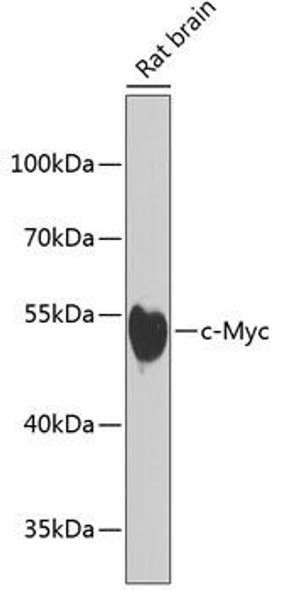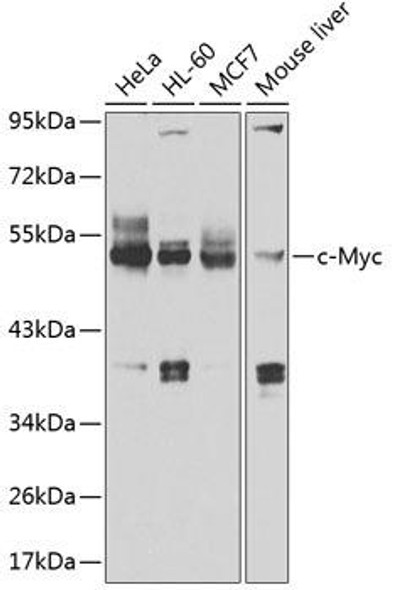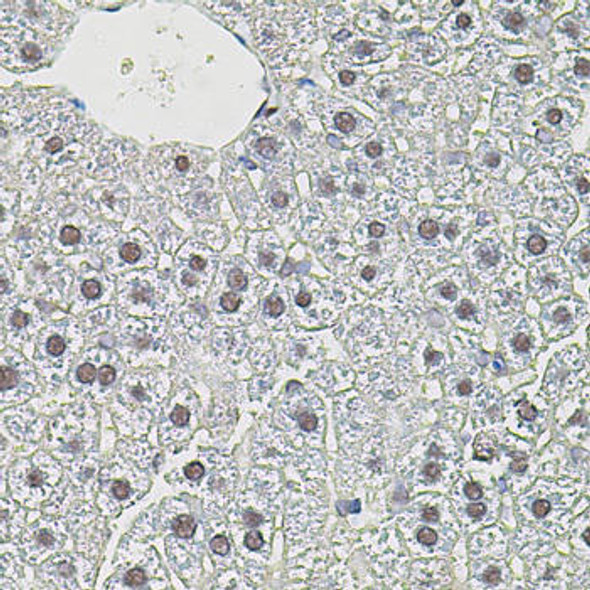Description
Myc Antibody (PACO28454)
The Myc Antibody (PAC028454) is a highly specific and sensitive tool for researchers studying the Myc protein, a key regulator of cell proliferation, growth, and apoptosis. This polyclonal antibody, developed using advanced technology, is raised in rabbits and is well-suited for detecting Myc protein levels in various biological samples.Myc is a transcription factor that plays a crucial role in cellular processes like cell cycle progression, metabolism, and differentiation. Dysregulation of the Myc gene has been implicated in the development and progression of various cancers, making it a promising target for cancer therapy research.
This antibody is validated for use in techniques such as Western blotting, immunohistochemistry, and flow cytometry, providing researchers with versatile options for detecting and quantifying Myc protein expression. By studying the role of Myc in cancer development and other diseases, researchers can gain valuable insights into potential therapeutic strategies targeting this important protein.
| Antibody Name: | Myc Antibody (PACO28454) |
| Antibody SKU: | PACO28454 |
| Size: | 50ug |
| Host Species: | Rabbit |
| Tested Applications: | ELISA |
| Recommended Dilutions: | |
| Species Reactivity: | Mouse |
| Immunogen: | Recombinant Mouse Myc proto-oncogene protein (1-439AA) |
| Form: | Liquid |
| Storage Buffer: | Preservative: 0.03% Proclin 300 Constituents: 50% Glycerol, 0.01M PBS, PH 7.4 |
| Purification Method: | >95%, Protein G purified |
| Clonality: | Polyclonal |
| Isotype: | IgG |
| Conjugate: | Non-conjugated |
| Synonyms: | Myc proto-oncogene protein (Proto-oncogene c-Myc) (Transcription factor p64), Myc |
| UniProt Protein Function: | Myc: a proto-oncogenic transcription factor that plays a role in cell proliferation, apoptosis and in the development of human tumors. Seems to activate the transcription of growth-related genes. |
| UniProt Protein Details: | Protein type:DNA-binding; Transcription factor; Nucleolus; Oncoprotein Cellular Component: axon; cytoplasm; mitochondrion; nuclear body; nucleolus; nucleoplasm; nucleus; perinuclear region of cytoplasm; protein complex; spindle Molecular Function:DNA binding; double-stranded DNA binding; protein binding; protein complex binding; protein dimerization activity; protein heterodimerization activity; sequence-specific DNA binding; transcription factor activity; transcription factor binding; ubiquitin protein ligase binding Biological Process: amino acid transport; B cell apoptosis; caspase activation; cell cycle arrest; cell proliferation; cellular iron ion homeostasis; chromatin remodeling; chromosome organization and biogenesis; detection of mechanical stimulus involved in sensory perception of sound; DNA damage response, signal transduction resulting in induction of apoptosis; glucose metabolic process; inner mitochondrial membrane organization and biogenesis; lactic acid secretion; MAPKKK cascade; middle ear morphogenesis; negative regulation of cell division; negative regulation of fibroblast proliferation; negative regulation of glucose import; negative regulation of monocyte differentiation; negative regulation of protein binding; negative regulation of transcription from RNA polymerase II promoter; pigmentation; positive regulation of B cell apoptosis; positive regulation of caspase activity; positive regulation of catalytic activity; positive regulation of cell cycle; positive regulation of cell proliferation; positive regulation of DNA binding; positive regulation of epithelial cell proliferation; positive regulation of fibroblast proliferation; positive regulation of glycolysis; positive regulation of mesenchymal cell proliferation; positive regulation of smooth muscle cell migration; positive regulation of smooth muscle cell proliferation; positive regulation of transcription from RNA polymerase II promoter; positive regulation of transcription, DNA-dependent; protein processing; pyruvate transport; re-entry into mitotic cell cycle; regulation of apoptosis; regulation of gene expression; regulation of mitotic cell cycle; regulation of oxidative phosphorylation; regulation of telomere maintenance; regulation of transcription, DNA-dependent; response to alkaloid; response to DNA damage stimulus; response to gamma radiation; response to radiation; skeletal morphogenesis; transcription from RNA polymerase II promoter; transcription initiation; transcription, DNA-dependent; transformation of host cell by virus; ureteric bud branching; Wnt receptor signaling pathway; Wnt receptor signaling pathway through beta-catenin |
| NCBI Summary: | The protein encoded by this gene is a multifunctional, nuclear phosphoprotein that plays a role in cell cycle progression, apoptosis and cellular transformation. It functions as a transcription factor that regulates transcription of specific target genes. Mutations, overexpression, rearrangement and translocation of this gene have been associated with a variety of hematopoietic tumors, leukemias and lymphomas, including Burkitt lymphoma, in human. There is evidence to show that alternative translation initiations from an upstream, in-frame non-AUG (CUG) and a downstream AUG start site result in the production of two isoforms with distinct N-termini, in human and mouse. Under conditions of stress, such as high cell densities and methionine deprivation, there is a specific and dramatic increase in the synthesis of the non-AUG initiated protein, suggesting its importance in times of adversity. Alternative splicing results in multiple transcript variants. [provided by RefSeq, Apr 2010] |
| UniProt Code: | P01108 |
| NCBI GenInfo Identifier: | 293629264 |
| NCBI Gene ID: | 17869 |
| NCBI Accession: | NP_001170823.1 |
| UniProt Secondary Accession: | P01108,P70247, Q3UM70, Q61422, |
| UniProt Related Accession: | P01108 |
| Molecular Weight: | 76.0 kDa |
| NCBI Full Name: | myc proto-oncogene protein isoform b |
| NCBI Synonym Full Names: | myelocytomatosis oncogene |
| NCBI Official Symbol: | Myc |
| NCBI Official Synonym Symbols: | Myc2; Nird; Niard; bHLHe39; AU016757 |
| NCBI Protein Information: | myc proto-oncogene protein |
| UniProt Protein Name: | Myc proto-oncogene protein |
| UniProt Synonym Protein Names: | Proto-oncogene c-Myc; Transcription factor p64 |
| Protein Family: | Myc protein |
| UniProt Gene Name: | Myc |
| UniProt Entry Name: | MYC_MOUSE |












